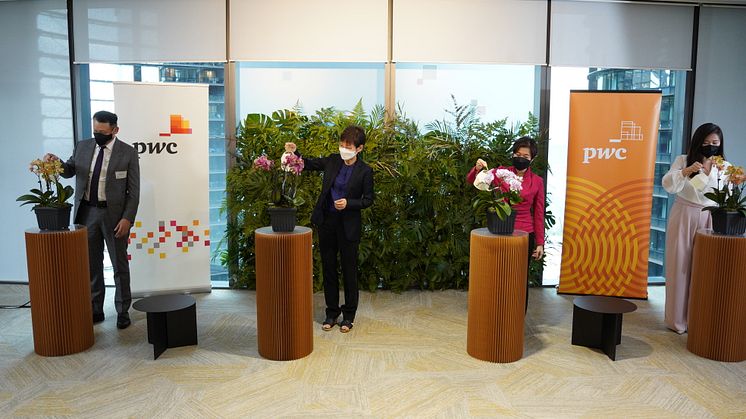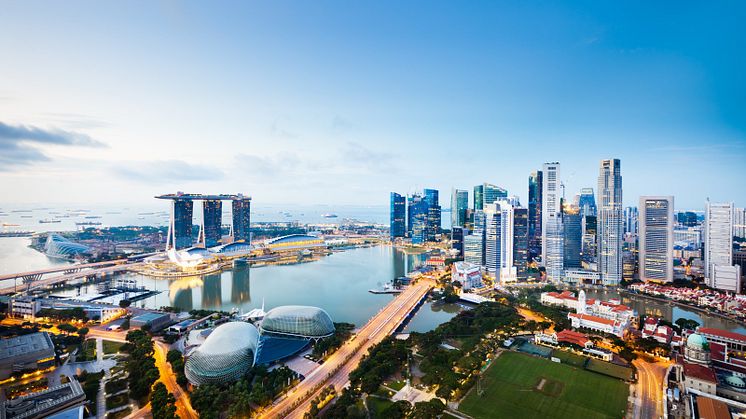
Press release -
Asia Food Challenge Report 2021 highlights additional US$750 billion needed by 2030 to satisfy fast-evolving tastes and demands of Asian consumers
- Investment opportunity highlighted is on top of existing levels reported in the inaugural report in 2019 – bringing the total investment required to US$1.55 trillion over the next decade
- The New Asian Consumer is demanding healthier, safer and more sustainable foods, accounting for US$2.4 trillion in incremental food spending by 2030
- Companies focused on health-based products have achieved valuation premiums of average 12% between 2015 and 2020 compared to non-adopters
September 21, 2021, Singapore – PwC, Rabobank and Temasek today launched the second edition of The Asia Food Challenge report which looks at six key trends highlighting evolving tastes and demands of Asian consumers. Coupled with changing demographics, rising affluence and growing incomes, the food choices of the new Asian consumer will drive US$2.4 trillion (55%) of the US$4.4 trillion incremental food spend in the next decade.
An additional US$750 billion in investment, on top of the US$800 my billion forecasted in 2019 (bringing the total to US$1.55 trillion) is now required to satisfy growing demands for healthier, safer or more sustainable food options.
Understanding the new Asian consumer
Priorities of Asian consumers has evolved from spending their growing disposable income on more expensive, tastier food towards value-seeking; demanding additional attributes as they become more sophisticated.
Asia’s food and agricultural industry needs to tap on this consumer-driven incremental food spend by developing new products and business models in response to the fast-evolving tastes and demands of Asian consumers.
The evolving tastes and demands can be summarised into the following six consumer trends, which often overlap and significantly influence each other:
- Healthier diets – Replacing processed foods, red meat, and sugar with healthier alternatives
- Fresh foods – Choosing quality products associated with freshness
- Safe and traceable sources – Requiring greater food safety and product validation measures
- Sustainable consumption – Tackling the environmental impact of food consumption
- Alternative proteins – Growing interest in innovative plant-based and cultured meat alternatives
- Online purchasing – Increasing use of e-commerce to enable convenient food purchasing and delivery
Asian consumers are shifting to healthier lifestyles and consumption habits – replacing red meat and sugar with fruit, vegetables, and healthy snacks, or selectively spending more on foods that offer qualities they value, such as freshness and nutrition.
They are also highly concerned about food safety, demanding more accountability about their food sources. This growing emphasis on transparency, while mainly for safety, also extends to the environmental impact of food production, as Asians opt for more sustainable food consumption including avoiding food wastage and buying local. The need for more sustainable food options has also bolstered an interest in plant-based proteins among Asian consumers, who are more open to vegetarian or flexitarian diets.
Lastly, Asian consumers have embraced online food purchasing, especially during the pandemic, as delivery and supply chain innovations offer greater convenience and speed.
Catering to Asia's diversity
Preferences and willingness by consumers to pay a premium within these six broad categories diverges widely across markets – such as concepts of “health” and “quality”. Catering to this large, diverse and dynamic market requires an intimate understanding of common regional trends and local nuances.
Macroeconomic and demographic trends will contribute almost half of Asia's 7% Compound Annual Growth Rate (CAGR) growth in food spend between 2019 and 2030. Asia's increasingly sophisticated consumers will be the biggest driver, accounting for 3.7 percentage points.
China, India and Southeast Asia are all expected to experience the strongest consumer-driven growth in food spend over the next decade.
- China’s huge population is expected to see the largest increase in consumer-led food spend, forking out US$1.2 trillion between 2019 and 2030.
- India, will lead the region in growth rates in consumer-driven food spend, posting a 5.3% Compound Annual Growth Rate (CAGR) expansion over the next decade, representing an increase of US$700 billion.
- Southeast Asian markets are expected to experience a 4.7% CAGR between 2019 and 2030, representing an increase of US$500 billion.
Businesses, innovators, entrepreneurs, and investors are recognising the social, economic and demographic drivers underpinning Asia consumption. They are also applying the local nuances of this diverse region to formulate strategies to deliver food products and services that appeal to consumers’ changing needs and demands. However, more is needed to meet this change.
Shaping the strategies of agri-food businesses and investors
To ensure the Agri-Food industry meets the needs and expectations of consumers, Richard Skinner, Asia Pacific Deals Strategy & Operations Leader, PwC Singapore, said: “Business leaders and investors have the opportunity to create significant value from these evolving consumer food trends. By investing to innovate and by producing better quality and healthier foods, the entire value chain stands to benefit - consumers stand to benefit from healthier and more environmentally sustainable food choices, businesses can command premium pricing and benefit from investment, whilst financial investors are able to create multiple uplift when it comes to business valuations and M&A.
On serving the new Asian consumer, Ping Chew, Asia Head of RaboResearch Food & Agribusiness, Rabobank, talked about the need for companies to look at their route to market strategy. He said: "Supply chain transformation will be a central theme across Asia to serve the needs of a growing population and emerging ESG concerns from both regulators and consumers. Simultaneously, as the distribution and last-mile infrastructure become digitalised, F&B companies will also need to adapt their route to market strategy to serve the new Asian consumer. This will require partnership across the value chain between companies, investors, research labs & innovators, and of course, governments."
Investment opportunity
The investment opportunity highlighted in the report comes in spite of a big increase in Agri-tech investments, which have almost quadrupled between 2014 and 2020.
There are bountiful opportunities for investors and business owners, who will play a pivotal role in the future of the industry when addressing the needs of Asian consumers.
When considering the key trends, this research shows that companies with a broad emphasis on health, digital and sustainable offerings have enjoyed valuation premiums over the last five years, compared with companies that did not.
Speaking on the investment opportunities in Asia’s food and agriculture industry, Anuj Maheshwari, Managing Director, Agribusiness, Temasek, said: “Asia's Agri-food sector offers tremendous opportunities for investors, entrepreneurs, and businesses. In order to achieve NetZero2050 and the United Nations Sustainable Development Goals, the industry needs to reinvent itself. Consumers too are demanding more sustainable, healthier foods and show willingness to pay for it. This is an unprecedented time in Agri-food tech space where companies who are open to new ideas and create innovations will be able create massive financial value, social benefits and improve planetary health. It is our hope that the report encourages greater innovation in the sector”.
The report methodology
‘The Asia Food Challenge Report 2021: Understanding the new Asian consumer’ considered the expectations and behaviour of Asian consumers and how this will drive the strategies of Agri-food businesses and investors. It examined key emerging trends in the sector, from food safety, healthy diets, and alternative proteins, to online commerce, convenience and supply chain traceability.
Findings were augmented with data from a survey of 3,600 consumers across 10 Asian countries, as well as Australia and New Zealand, seeking to understand their complex and changing relationship with food. The consumer demographics covered various income, education, occupations, and household sizes. In addition to the study, 3,000 publicly traded food and beverage companies globally were analysed and multiple senior executives and leading experts in the food sector were consulted.
-End-
Topics
Categories
About PwC
At PwC, our purpose is to build trust in society and solve important problems. We’re a network of firms in 155 countries with over 284,000 people who are committed to delivering quality in assurance, advisory and tax services. Find out more and tell us what matters to you by visiting us at www.pwc.com/sg.
PwC refers to the PwC network and/or one or more of its member firms, each of which is a separate legal entity. Please see www.pwc.com/structure for further details.
© 2020 PwC. All rights reserved





